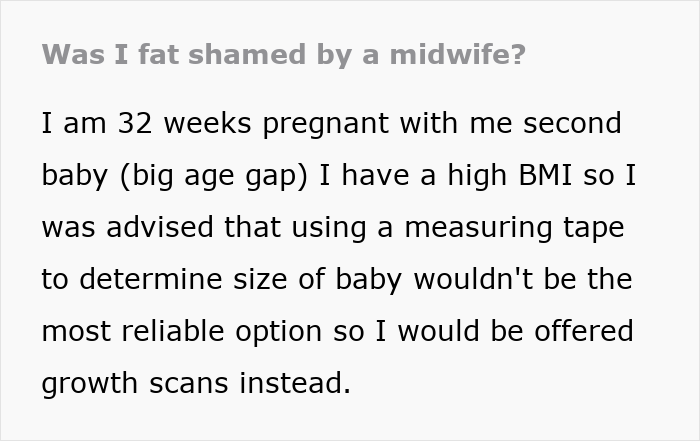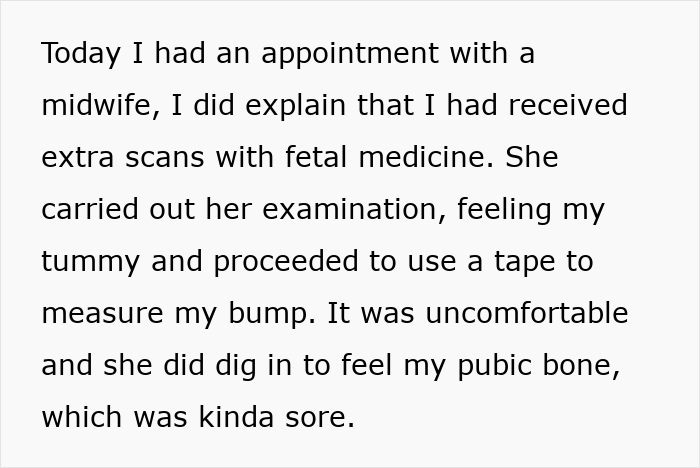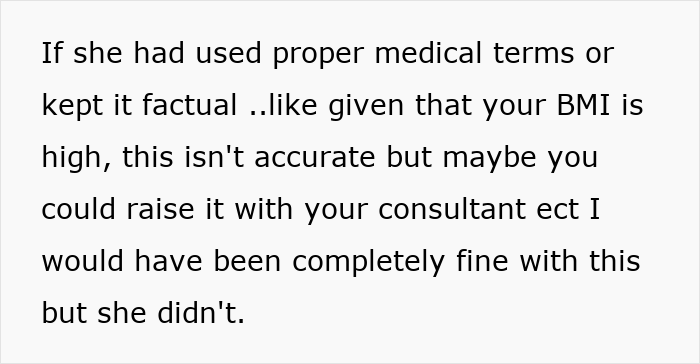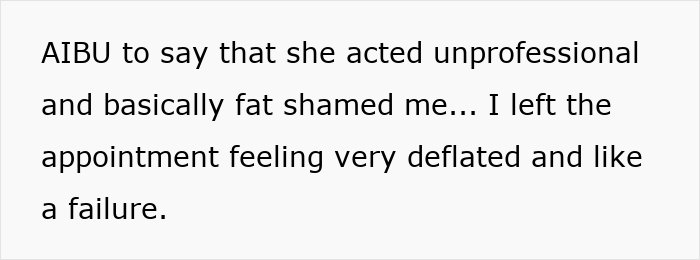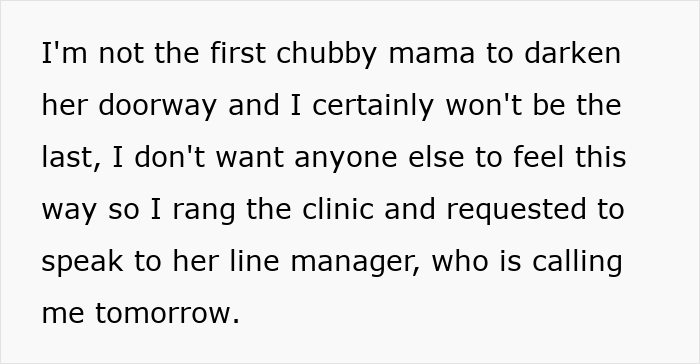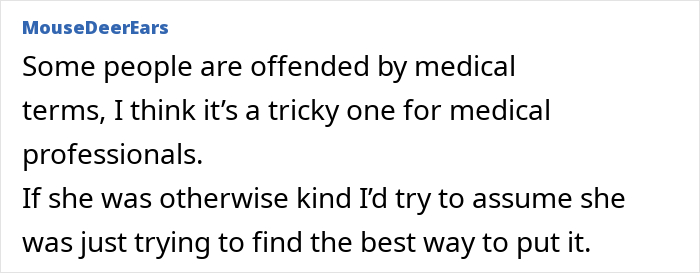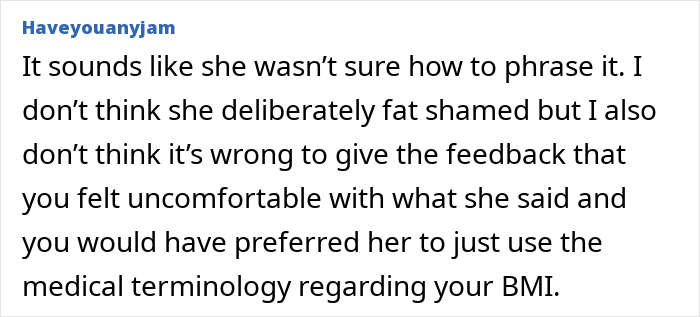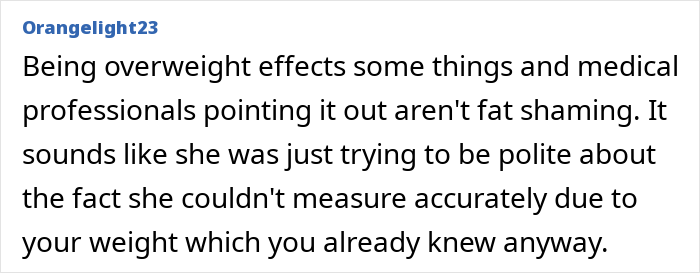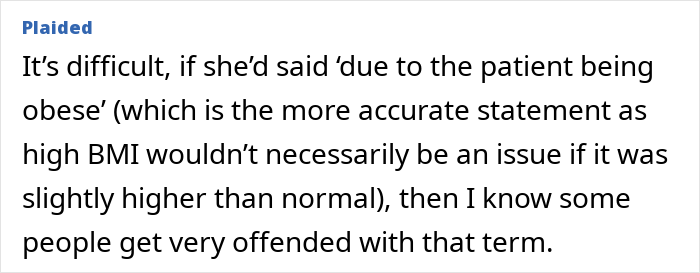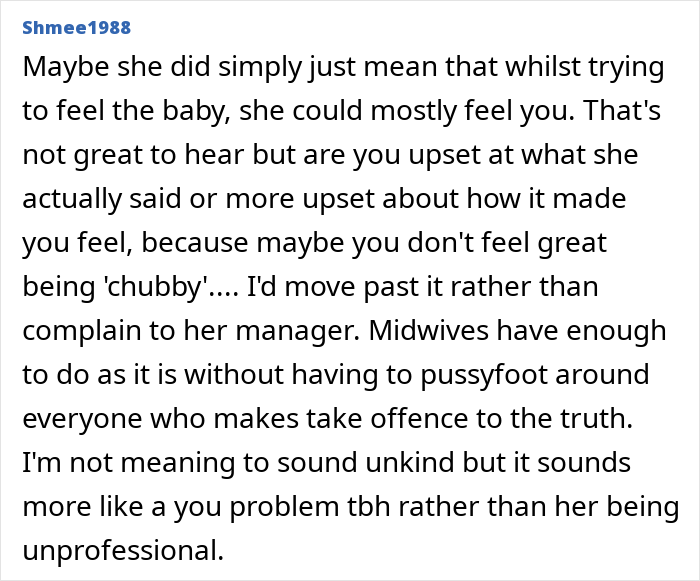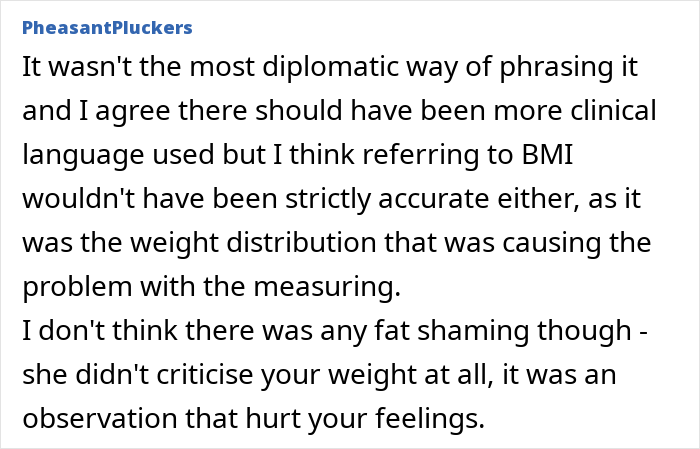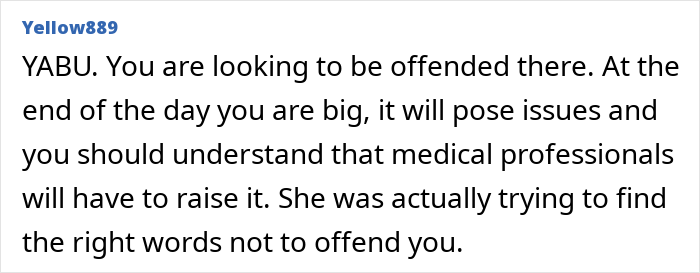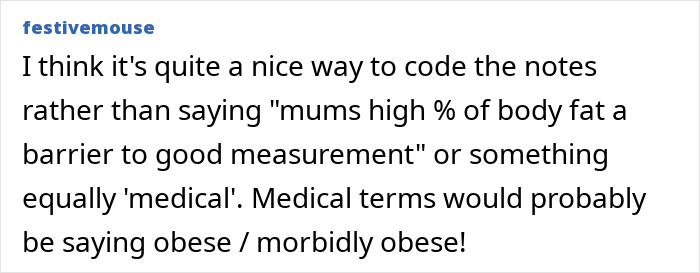[ad_1]
Empathy, compassion, tact, and emotional intelligence are important in many professions, but they are absolutely vital in healthcare. Doctors, nurses, and healthcare workers with good bedside manners are invaluable and help put their patients at ease. After all, how you say something is just as important as what you say. In some cases, however, a worker’s attempt to lighten the mood can be considered unprofessional behavior or tone-deaf.
Case in point, a mom turned to the Mumsnet community for advice about a rather sensitive situation. The woman, pregnant with her second child, shared how she felt fat-shamed by her midwife’s comment on her high BMI, and asked for people’s thoughts on the whole encounter. You’ll find the full story and the internet’s reactions below. Bored Panda has reached out to the author for comment, and we’ll update the article as soon as we hear back from her.
A healthcare professional’s bedside manner is incredibly important for building trust with their patients
Image credits: freepik (not the actual image)
A pregnant woman turned to the internet for advice after feeling like she was fat-shamed by a midwife recently
Image credits: jcomp (not the actual image)
Image credits: photoroyalty (not the actual image)
Image credits: PassMeTheLiquor
A recent report suggests that looking at a person’s BMI isn’t enough to determine how (un)healthy they might be
Referring to a new report published in The Lancet Diabetes & Endocrinology journal, the BBC states that it may be medically flawed to call people obese, and there’s a need to split the definition into two: ‘clinical obesity’ (where their medical conditions are caused by their weight) and ‘pre-clinically obese’ (for individuals who are overweight yet still fit, though at risk of disease).
The worry is that relying just on a person’s body mass index (aka their BMI) to determine obesity might miss some nuances. Around a billion people around the world are estimated to be living with obesity.
“Some individuals with obesity can maintain normal organ function and overall health, even long term, whereas others display signs and symptoms of severe illness here and now. Obesity is a spectrum,” explained Professor Francesco Rubino, from King’s College London, who chaired the expert group.
According to the report, a blanket definition of obesity means that some people are misdiagnosed as obese, but they don’t receive the most appropriate care. As an example, someone may be very physically active yet on the larger side. Or someone who has a lot of muscle mass and a low body fat percentage can be misdiagnosed as being borderline obese.
An adult’s BMI is calculated by dividing their weight (in kilograms) by their height (in meters squared). In many countries, having a BMI of over 30 is currently considered as a mark that someone is obese.
However, this approach, while useful on a large scale, tends to fall apart if you don’t look at an individual’s family history, body fat percentage, overall fitness, whether or not they have any serious diseases, what kind of fat they have, etc. In short, only a detailed look at a patient’s medical history can give you a proper understanding of how (un)healthy they are.
Someone who is clinically obese may have heart disease, type 2 diabetes, joint pain, feel out of breath, and have a hard time doing day-to-day activities. In these cases, drugs or surgery may be used for treatment.
Meanwhile, pre-clinical obesity doesn’t yet cause any illnesses, so the person should be offered weight-loss advice, counseling, and monitoring, according to the BBC. The goal is to reduce the individual’s chances of developing health problems later.
As per children’s obesity expert Professor Louise Baur, from the University of Sydney, who contributed to The Lancet’s report, the new approach should reduce the number of people being overdiagnosed and given unnecessary treatment.
Often, pregnant women with higher BMI feel fat-shamed and stigmatized. Some healthcare professionals make jokes at their expense
The BBC notes that women with higher BMI feel stigmatized by risk messaging in maternity care. Research by Cardiff University and the British Pregnancy Advisory Service found that pregnant women are often infantilized.
“It feels like sometimes decisions are made about them, for them,” said Clare Murphy, the director of BPAS.
The BBC reports that Alexandra Dodds, a mother of four, felt fat-shamed at her pregnancy scan and during follow-up appointments. According to the patient, her weight was raised at every appointment.
“It was just kind of jokes, like ‘hope you’ve stopped the Christmas snacks’, or ‘make sure you’ve thrown the box of chocolates away.’ I didn’t feel like it was said in a spiteful way to try to upset me, it was like banter, but I don’t feel like you can banter about that,” Dodds said, adding that discussions of her weight dominated her entire care.
“I didn’t feel this was a person that I could talk to openly [to] support me, so I just left not knowing really what I could do. I was really, really sad. If I feel any level of shame, that’s just a clear indication that I have to talk about it, because it means I’m not the only person and other people will understand.”
Michigan Instruments reports that good bedside manners have a lot of benefits for patients, who typically value compassion, patience, comfort, and personality.
For one, medical staff who are empathetic, kind, and caring can make their patients feel valued, less stressed, less anxious, more involved in their own health, and like they can trust their doctors and nurses more.
When there’s a genuine connection of trust, respect, and transparency between the patients and healthcare workers, the former feel more comfortable sharing their concerns and asking questions.
What’s more, good bedside manners can mean that the patient will stick to the prescribed treatment plan, take their medicine, and follow through with their appointments in the future. There’s an upside for the staff, too: good doctor-patient relationships improve job satisfaction as a whole. That, in turn, means that the healthcare staff are more motivated and see even more purpose in their jobs.
What are your thoughts, dear Pandas? What kind of communication do you value the most when interacting with healthcare professionals? Where do you think the line lies when it comes to jokes, quips, and cheeky comments? How good are the relationships that you have with your doctors? Let us know what you think in the comments!
Quite a few internet users thought that the author of the viral story may have slightly overreacted to the midwife’s comments
Some people shared similar stories of their own
There were also some parents who supported the mom and said that she wasn’t wrong to be upset
[ad_2]
Source link



